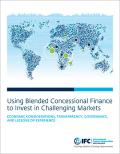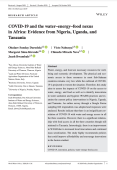

Water, energy, and food are necessary resources for wellbeing and economic development. The physical and economic access to these resources in most Sub-Saharan countries remains very low while the outbreak of COVID-19 is projected to worsen the situation.
Therefore, this study aims to assess the impacts of COVID-19 on the access to water, energy, and food as well as to identify innovations in water sanitation and hygiene (WASH) practices and examine the current policy interventions in Nigeria, Uganda, and Tanzania.
An online survey through a Google Forms sampling 842 respondents was adopted and responses were analyzed. Results indicate that there is an insignificant correlation of COVID-19 with water and energy access in all the three countries. However, there is a significant relationship with food access in all the three countries though still minimal in Tanzania. Interestingly, there is an improvement in WASH due to increased local innovations and continued mass sensitization. The study highly recommends policies that could improve affordability and encourage innovations in the factors studied.
